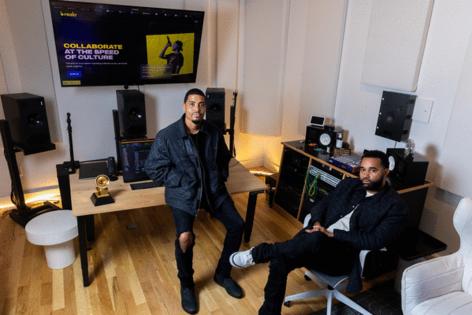Atlanta music tech startup is betting on the growth of the creator economy
Published in Business News
The creator economy is one of the biggest developments of the digital age.
Over the past decade, advertisers have funneled billions of dollars into paying social media users with large followings to promote anything from beauty products to new albums. Goldman Sachs predicts the sector will be worth nearly half a trillion by 2027.
Atlanta startup founders and brothers Ameer and Anthony Brown are taking advantage of this growth. Turning their focus to the music industry, the two have created a platform to provide infrastructure within the convoluted network of influencers, marketing agencies and record labels all trying to do business with one another.
Breakr, as it is called, consolidates many of the administrative tasks each party must complete on disconnected services into one platform. It provides payment-processing software, real-time metrics on social media performance, a search and discovery engine and other customer relationship management tools, to both ends of the business deal.
Launched in 2020, the music technology startup is now valued at $20 million and backed by high-profile investors such as Salesforce CEO Marc Benioff and recording artist Nas.
About 60,000 artists and 20,000 influencers have onboarded Breakr. So have industry heavyweights Interscope Records, Capitol Records and Warner Music Group.
After spending several years working in tech in Silicon Valley, Ameer and Anthony Brown settled in Atlanta shortly after founding Breakr. They decided to build their company in Atlanta for a few reasons: its lower cost of living compared with other major metropolitan areas, established tech community and significance in the music industry.
Here’s how the platform works: An artist or record label will upload a song to Breakr’s marketplace and create a campaign with a budget for the type of content they want to see influencers make with it. Social media creators, on the other half of the platform, create profiles and set parameters around the type of content they want to make and how much money they want to make from promoting a song or a product. They’ll then explore open campaigns from artists or labels, and submit to the ones they like.
Breakr said it has run campaigns for Lady Gaga, Kendrick Lamar, Rick Ross, Future and Travis Scott.
Through Breakr, creators are paid for their work within 48 hours, a rapid turnaround compared with the typical timeline of brands and agencies. With high management overhead and hundreds of small invoices and 1099s to deal with, it usually takes weeks for payout to occur.
“We want to be the central node that connects all of these people and removes all the administrative burden that occurs with having them interact. That’s what the creator economy is missing desperately,” said Ameer Brown. “And it’s cool that two Black dudes from Atlanta started it.”
Brave new world
Social media content creation isn’t a new phenomenon, but the power and influence of online creators trying to capture a share of audience attention has intensified. For some musicians, having a song go viral is equivalent to having their music played on the radio.
Grammy-award winning Christian hip-hop artist and label owner LeCrae views connecting with influencers as a way to get music in front of people. It’s becoming harder to do that, however, as social media platforms have become saturated with users, music distribution services have made releasing music easier than ever and algorithms have become increasingly complex, LeCrae said.
LeCrae, who runs Atlanta-based Reach Records, found Breakr when he was looking for an easier way to find influencers. He wanted to cut out the middleman — he was dealing with a number of talent agencies representing influencers who he said were charging an arm and a leg for services that didn’t align with his needs.
Using Breakr helped level the playing field for his small label, he said. Influencers may not respond to independent artists or labels when they reach out via social media. But they’ll respond to a campaign on Breakr knowing that there’s a set budget in place.
“Breakr says there’s no gatekeeper anymore,” LeCrae said.
Breakr has evolved in its four years of operation, introducing new features and services in response to feedback from clients using the platform. They are now transitioning Breakr from a management services company to a software-as-a-service business — one that allows agencies to sit on top of their payment infrastructure, said Anthony Brown.
Anthony Brown envisions Breakr becoming a $10 billion company in five to 10 years, growing as the creator economy morphs into the future of advertising.
“But the thing is, we won’t be able to get there as an industry until there’s more centralization and more infrastructure to digitize the way that agent sees brands and creators interact,” Anthony Brown said. “That’s what we’re building.”
©2025 The Atlanta Journal-Constitution. Visit at ajc.com. Distributed by Tribune Content Agency, LLC.















Comments